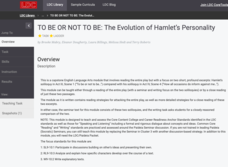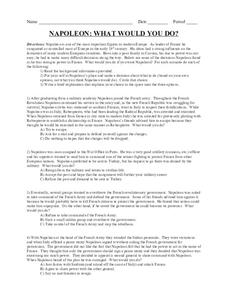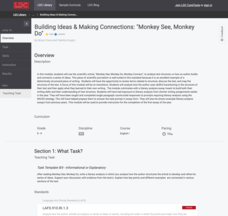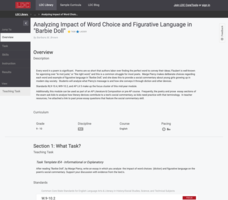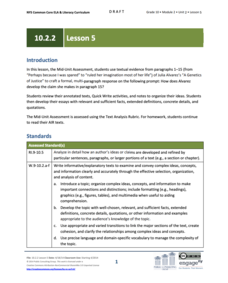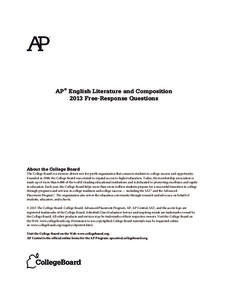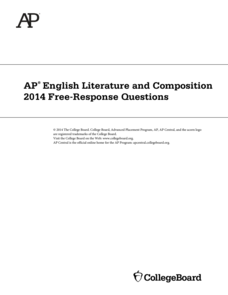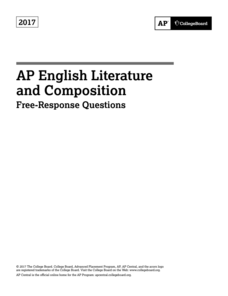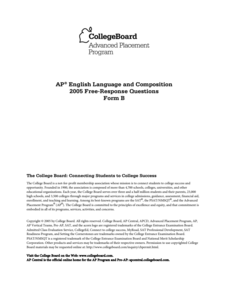National Endowment for the Humanities
Lu Shih — The Couplets of T’ang
Writing poetry in ancient China was the modern equivalent of sending a greeting card. Scholars learn about the ancient Chinese poetic form called the lu shih. They read about the context of poetry during the T'ang Dynasty and complete a...
Literacy Design Collaborative
To Be or Not to Be: The Evolution of Hamlet’s Personality
How does Hamlet's state of mind change over the course of Shakespeare's most famous revenge tragedy? After a close reading of Hamlet's soliloquies in Act III, scene 1 and Act IV, scene iv, class members engage in a Paideia/Socratic...
Beverly Hills High School
Napoleon: What Would You Do?
Begin a study of Napoleon Bonaparte and the French Revolution by presenting class members with 10 situations that Napoleon would face as he rose to power. Individuals select one of three options for each scenario that represents what...
Literacy Design Collaborative
Building Ideas and Making Connections: "Monkey See, Monkey Do"
Reading a scientific article about cross-species synchronization may sound like a yawner. But "Monkey See, Monkey Do" is a fascinating tale that just happens to be about yawning, within and across species. After a close reading, class...
Literacy Design Collaborative
Macbeth: Influence of Supernatural
Something wickedly wonderful this way comes in a lesson that focuses on Macbeth. After a close reading of the play, class members craft a literary analysis essay in which they use evidence from the text to show how Shakespeare uses the...
Literacy Design Collaborative
Analyzing Impact of Word Choice and Figurative Language in "Barbie Doll"
After a close reading Marge Piercy's poem "Barbie Doll," class members craft an AP®-style explanatory essay in which they analyze the diction and other figurative literary devices the poet employs to deliver her commentary on modern...
EngageNY
Grade 10 ELA Module 2: Unit 3, Lesson 7
It's time to show what you know. The final lesson asks scholars to reflect on the seven-lesson plan unit and complete an end-of-unit task. Readers consider the claims presented in speeches by Eleanor Roosevelt and Malala Yousafzai before...
EngageNY
Grade 10 ELA Module 2: Unit 2, Lesson 10
All good things must come to an end! Scholars put all their learning into practice by completing an end-of-unit assessment. They use textual evidence from Julia Alvarez's "A Genetics of Justice" to write essays analyzing how Alvarez...
EngageNY
Grade 10 ELA Module 2: Unit 2, Lesson 5
How do learners use textual evidence from a close reading to write a well-developed essay? Scholars try it by completing a mid-unit assessment based on their analysis of the first 15 paragraphs from "A Genetics of Justice" by Julia...
EngageNY
Grade 10 ELA Module 2: Unit 1, Lesson 20
Readers take all the information they gained from the last 19 lessons and complete an essay describing how King develops his purpose and claim in "Letter from Birmingham Jail." Pupils use a rubric and checklist to help guide their...
EngageNY
Grade 10 ELA Module 2: Unit 1, Lesson 10
Scholars review the previous nine lessons of analysis of King's "Letter from Birmingham Jail" and use their work to create a formal essay responding to a writing prompt about the purpose of the work. This mid-unit assessment is a quick...
College Board
2012 AP® English Literature and Composition Free-Response Questions
Does the world shape a person's character? Scholars choose a novel or play, take a close look, and write essays about how surroundings affect a character. Writers also analyze literary elements in an excerpt from a novel and poetic...
College Board
2013 AP® English Literature and Composition Free-Response Questions
Is there a moment that changed your life? Readers analyze novels and plays to discover the moments in which characters change from children to men. Writers also create essays to analyze literary devices used in The Rainbow and figurative...
College Board
2014 AP® English Literature and Composition Free-Response Questions
How much would you give up for others? The last prompt in 2014 AP® English Literature and Composition Free-Response Questions asks scholars to write essays about a character in a piece of work that has sacrificed and what the sacrifice...
College Board
2015 AP® English Literature and Composition Free-Response Questions
It is a cruel world. Scholars create essays about a piece of work that describes what cruelty reveals about a character. A prompt from the 2015 AP® English Literature and Composition Free-Response Questions also contains two other essay...
College Board
2016 AP® English Literature and Composition Free-Response Questions
Have you ever met a wolf in disguise? The last essay question in the 2016 AP® English Literature and Composition Free-Response exam asks writers to think of deceitful characters and create essays describing why they carried out...
College Board
2017 AP® English Literature and Composition Free-Response Questions
Music brings back a memory. One prompt from the 2017 AP® English Literature and Composition Free-Response Questions asks scholars to read a poem and write essays analyzing the relationship between music and the author's memories. Two...
College Board
2018 AP® English Literature and Composition Free-Response Questions
Can a gift be a burden? Scholars take a close look and write essays about characters that have gifts that can also be a disadvantage. Two other essays include discussion of how Nathaniel Hawthorne and Oliver Senior use literary...
College Board
2002 AP® English Language and Composition Free-Response Questions Form B
"Don't go forth today." Why would Caesar's wife not persuade him to stay home? Scholars read an excerpt from the play Julius Caesar and write essays on why Caesar listened to Decius rather than his wife. Pupils then write two more essays...
College Board
2003 AP® English Language and Composition Free-Response Questions Form B
You took the words right out of my mouth! One question in 2003 AP® English Language and Composition Free-Response Questions Form B allows scholars to develop opinions on pupils receiving zeros for plagiarism. Other essays analyze ideas...
College Board
2004 AP® English Language and Composition Free-Response Questions Form B
Are there unspoken rules everyone should follow? Questions from the 2004 AP® English Language and Composition Form B ask scholars to give opinions on how unspoken rules help people belong in society. Pupils also analyze a writer's...
College Board
2005 AP® English Language and Composition Free-Response Questions Form B
Communication is the key. Prompts from the 2005 AP® English Language and Composition Free-Response Questions Form B allows scholars two opportunities to analyze the use of communication to express thoughts. First, pupils look at...
College Board
2008 AP® English Language and Composition Free-Response Questions Form B
Ever feel like resources limit pupils with multiple-choice questions? Writers receive freedom of expression with three free response questions. Topics include text read in high school English, opinions on American education, and...
College Board
2000 AP® English Language and Composition Free-Response Questions
No one is perfect. George Orwell argues imperfection is preferred over sainthood. Scholars write essays describing how he expresses his argument in writing. Writers also respond to Eudora Welty's recollection of life experiences with...



